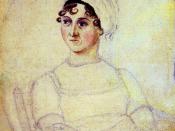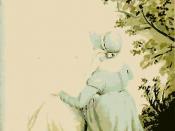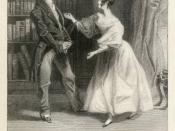Jane Austen successfully portrays the Age of Reason through her characters in Pride and Prejudice. The story revolves around a mother of five daughters, Mrs. Bennet, whose sole purpose is to marry off her daughters to suitable men. Her eldest, Jane, is her most prized daughter. Mrs. Bennet is assured that Jane's beauty and meticulous manners will win her a prized husband who may be able to support not just Jane, but her other sisters as well. The story of this quest told through the second daughter, Elizabeth. She does not necessarily want to be confined to all the expectations of the age. Elizabeth is the only character who demands to marry not only
a suitable man, but one she also loves. As far as her younger sisters quests, Lydia and Catherine are immature and simply obsessed with flirting with officers. Once Mrs. Bennet begins to
accomplish her goal of marrying her daughters, the reader is able to evaluate some basic values of Austen's portrayal of the Age of Reason.
There are four main marriages in the novel: Charlotte's
to Mr.Collins, Lydia's to Wickham, Jane's to Mr. Bingley, and Elizabeth's to Mr.Darcy. Through these marriages, Austen will explain what makes a good marriage and what one must posses in
order to fulfill the requirements of the age.
Mr. Collins will be the inheritor of the Bennet family's home when Mr. Bennet dies. When Mrs.Bennet hears Mr.Collins may be interested in one of the daughters she is ecstatic because this will ensure that the home stays with one of her girls. Mr. Collins hears that Jane is involved with Mr. Bingley, so he moves on to Elizabeth. Lizzy flat out declines his proposal of marriage. Mr. Collins can not accept no as an answer. Mr.Collins simply needs someone to
marry him. He does not care about love or beauty. Thus, When he meets Charlotte Lucas, it is obvious they can satisfy each others needs because Collins needs a wife to present to Lady Catherine and Charlotte is in danger of becoming an old maid. Their contract of marriage was based on absolutely no physical attraction or true love. Their marriage could be classified as a typical marriage of the time. Their marriage was convenient. Charlotte is happy because she receives a home and secure social standing. Collins is pleased because he can go on about his duties to Lady Catherine.
Elizabeth does not comprehend why someone would marry without any true love for his or her husband. The most likely cause of her lack of understanding probably results from growing up in a household where her mother and father showed no affection whatsoever for each other. Elizabeth is mindful of her father's mistake in marrying her mother. The two had nothing in common with each other. One of the few times Mr. Bennet interferes with his wife's business is
when he backs Elizabeth up when Mrs. Bennet tries to force her to go back and accept Mr.Collins' proposal. After Mr. Collins moves onto Charlotte, Mrs. Bennet continues to press Lizzy for information about his relations with her best friend. She points out that Charlotte lives comfortably and will never be distressed for money (186).
After the affair with Mr. Collins, Mrs. Bennet is still stuck with five unmarried daughters. Jane is still getting aquatinted with Mr. Bingley, a rich suitor, Elizabeth still has no prospects, and
two her three younger sisters are still chasing young officers. Suddenly when everything looks its brightest for Jane, Bingley picks up and leaves Netherfield. This event leaves the family in total
despair. Elizabeth decides to go off to live with her aunt in London, Jane goes with another aunt, and Lydia leaves for Brighton with a colonel and his wife. As each goes her own way, they have
time to reflect on their own needs and desires. Elizabeth learns that Wickham was not totally truthful with her about both himself and Darcy. She also learns that Darcy prevented the relationship between Bingley and Jane from developing any further because of Jane's weak social standing. Suddenly, word comes that Lydia has run off with Wickham. Lydia's improper actions will surely ruin any of her sisters chances of becoming decently married. The entire family will be sure to be outcasts. Running off with a man you are not properly married to is not tolerated during an Age of Reason. This is an age of manners, etiquette, rules, and codes. However, the rules that society lives by can be romantic barriers for a magnificent marriage, as we will see later on with Darcy and Elizabeth.
In Lydia's case, she is simply obnoxious and rude. Elizabeth thinks her sister lacks both decency and virtue (230). To this age, she is the symbol of everything a person is not to be. She
is irrational and wavering. Lydia's behavior is more that of a flighty Romantic. She is ever-changing in her moods and behavior and wants no responsibility. Her reckless actions will cause both her family and society to shun her.
The worst aspect of the whole Lydia-Wickham affair is that Lydia does not even think she has done anything wrong. All her relatives know well that Wickham has no real love for Lydia.
Wickham himself "has neither integrity or honor"(230). He will not marry a woman without some money (229). Lydia does not have much to offer anyone but health and youth (230). In this age, Lydia's irrational decision- making is, by definition, scandalous. She is scolded for acting in a way that can harm her sisters' chances of marrying well. It is quite obvious that the marriage of Lydia and Wickham is a recipe for disaster.
The couple have no real love for each other and neither has any money. At least Charlotte
and Collins fulfill each other's needs for security. The marriage of the Lydia to Wickham will be a waste. They have nothing in common really, and neither can provide anything the other needs. No matter how much their marriage does not make sense, it must take place in order to save the reputation of all parties involved. Elizabeth does not realize that Darcy is the one who helped to locate Wickham and Lydia in London and bring them back to Netherfield. As far as she knows, she believes it is her uncle, Mr. Gardiner, who solves her family's problems.
Elizabeth has already made up her mind about Darcy from the first time she became aquatinted with him at a ball. She believed him to be snobby and arrogant. Darcy took notice of Elizabeth and became fond of her when she stayed at Mr. Bingley's when Jane was sick. Unfortunately, Elizabeth's preconceptions ended up causing both her and Darcy pain. When Elizabeth heard word from Darcy's friend, Colonel Fitwilliam, that Darcy had "saved a friend from the inconveniences of a most imprudent marriage"(153), she was immediately angered that Darcy would ruin Jane and Bingley's relationship and break her heart.
Darcy is unaware of Elizabeth's dislike of him when he makes a proposal of marriage to her, but he becomes aware quickly when Elizabeth shoots down his proposal and tells him exactly everything she thinks of him. Darcy writes a letter that contains all his true feelings and hands it to Elizabeth. The letter is the turning point of the novel. Elizabeth, the only character who is seeking only true love in a marriage, is totally blind when it is right in front of her. She becomes "absolutely ashamed of herself" (171). Up to this point, Elizabeth has always believed she possessed the ability to make out people's personalities. Now, she realizes that all this time she has been ignorant, biased, and prideful, therefore driving "reason away"(171). Reason, which is the main theme of the Enlightenment World View, is clearly the most important characteristic to have. Emphasis is placed in the stable, reasonable man and woman. Up to this part in the novel, we have believed that Elizabeth was the ideally rational character. Now, we are aware of the vanity involved in all the judgments she made of people. Elizabeth expresses sincere remorse for her bad judgment, a fact which makes us feel sorry for her. When Darcy returns to Netherfield
with Bingley she almost does not know how to act now that she knows the truth.
Jane and Bingley resume their relationship once again. Mrs. Bennet says she wants nothing to do with him, but once she hears he wants to see Jane, she quickly changes her mind. Even worse, Darcy becomes a target of Mrs. Bennet's rude, piercing comments at the dinner table, but Bingley shows more affection for Jane than ever before. Jane is the perfect example of what a woman of the Age of Reason should be. She is polite, rational, conservative, and social.
Jane does not act too timid and shy around Bingley anymore. Lizzy told Jane that Bingley lost interest in her because she did not seem sincerely interested. This time, Jane is armed with the
knowledge that her sister Lizzy gave her. Jane is now more openly responsive to Bingley's signs of affection.
All that is needed to ensure the success of yet another marriage for Mrs. Bennet is a little communication. One would believe that during an age where society, rather than the individual is stressed, good communications would exist. Unfortunately, the need to be so polite and courteous prevents an open exchange of feelings. Lack of communication almost cost the Jane a marriage the first time. Elizabeth is not going to allow Jane to miss the opportunity the second time around. Elizabeth can not be happy until she sees that her sister is happy once again.
This time, Jane and Bingley are successfully engaged. The Bennets became the "luckiest family in the world, though only a few weeks before, when Lydia had first run away, they had been generally proved to be marked out for misfortune" (282). Mr. Collins observes that "Lydia's sad business has been so well hushed up,"(293) that nobody except the Gardiners, Elizabeth, and Jane knows that Darcy was the one who saved them all.
Finally, Elizabeth and Darcy are alone on a walk when the issue of the past proposal and events resurface. Darcy shows his complete unselfishness by telling Elizabeth that everything he
did for Lydia was only for her. Elizabeth now has nothing standing in her way to prevent her from accepting an offer of marriage from Darcy. She tells Lady Catherine De Bourgh that she will not decline an offer of engagement from her nephew. Lydia's mess is now all cleared up and smoothed over. Jane was now finally happily engaged to Bingley. All Elizabeth's barriers to love another are now gone.
Elizabeth now fully respects Darcy after finding out the truth about him from his letter. She admires him for being who he is, a man of manners, decorum, and integrity. Lastly, she expresses extreme gratitude for all that he has done for both of her other sisters, especially Lydia. Darcy did not have to overcome so many barriers. The only barrier that exists for him is the vast
difference in family class between the two. However, this seems to bother others much more than it bothers him.
The marriage between Darcy and Elizabeth shows the most promise. It is evident that they will always have something to talk about. The two genuinely love each other. The most unlikely marriage to occur of the three previously mentioned marriages, turns out to be the strongest! Darcy is a man of reason, stability, and intellect. He was a typical symbol of the Age of Reason all along. Elizabeth, after realizing how blind she was, is now a fitting woman of the age. She still has her intellect, but now she has more reason. Both of them are more socially stable now that they are married.
Austen clearly conveys her judgment of the characters and their actions through their marriages. She does not favor anyone who does not have the general characteristics that the age demands. Clearly, the ones who understand and live according to the values of the Age of Reason are her favorites. Lydia and Wickham's marriage, the only marriage that is totally denounced, is the one that was not at all reasonable. Through Darcy and Elizabeth's marriage, however, Austen shows that you do not need to be a Romantic to fall deeply in love. Austen obviously supports those who demonstrate the basic virtues of the age such as: intellect, reason, sociability, moderation, and stability.


